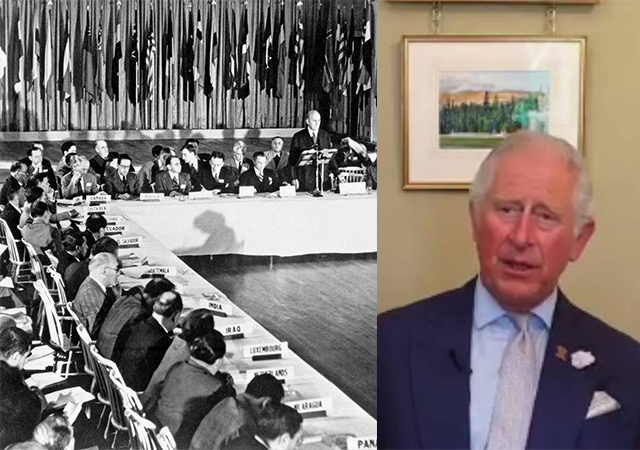 Bretton Woods 1944 and Prince Charles launches Commonwealth Sustainable Cities project in June 2020.
Bretton Woods 1944 and Prince Charles launches Commonwealth Sustainable Cities project in June 2020.
As the world creeps out of (and sometimes back into) COVID-19 lockdown, many are talking about the type of world that will arise from the ashes of the pandemic. It’s been called #TheGreatReset. Others have compared it to the reforging of global relations after World War Two.
Writers for The Round Table: The Commonwealth Journal of International Affairs and the Round Table website have been a part of this virtual coming together of minds on the issue of how to reset the planet after the coronavirus pandemic.
In a research article for the journal, Syed Sharfuddin – a former special adviser at the Political Affairs Division at the Commonwealth Secretariat – looked at the world after COVID-19. He outlined the development of multilateral institutions after World War Two and the spirit behind the Bretton Woods system. He wrote: “In the new international order, the role of multilateral institutions will be critically reviewed. Countries will be reluctant to fund organisations, which are no longer relevant in the new world. The funding structures in the UN, the Commonwealth, WHO and OIC point to a fundamental weakness under which major contributors hold the power to force these organisations to work for their national interest first before pursuing wider common interests. New rules will be adopted to make these institutions more accountable to donors.”
In another blog written for the Commonwealth Secretariat and shared with the Round Table website, Devyn Holliday – a Research Officer with the Economic, Youth & Sustainable Development Directorate – asked what had been lost in the smoke of COVID-19. “People across the globe are facing mounting threats to their well-being compounded by growing unemployment, lockdown in vulnerable living conditions, and decreases in aid and remittances,” he wrote. He concluded: “COVID-19 is unlike any other challenge faced in the modern era, thus to fight it we must use unprecedented ways of thinking and planning. It is not enough to fight the disease while other development efforts are left to wane without resources and attention. Country responses must take into account how their vulnerable populations are being doubly affected by not only the virus, but also by the responses intended to keep them safe.”
The focus turned to the rise of China in the aftermath of the pandemic in an article for the journal by Round Table’s Paul Flather. “The Commonwealth needs a China policy,” he wrote. “As China’s international presence grows, as it flexes global muscles, as our post-1945 global order crumbles, and as individual Commonwealth nations increasingly face their own China-related crises, it is surely time to express a common defence of human rights and democratic values.”
A conference held in June by the Institute of Commonwealth Affairs also looked at ways in which the Commonwealth can rebuild, using the lessons from the pandemic. Speakers outlined the role of universities, the need to extend care and attention to migrant communities and the importance of collaboration to move the world forward. From New Zealand to the United States and China, speakers compared the way various countries had handled the pandemic.
An earlier conference in June had examined the lessons from the pandemic for the building of future cities across the Commonwealth. Prince Charles said during his launch of the Sustainable Cities project that the world could see more clearly that it needed development that heals rather than harms, looking through a “post-Covid lens”.
The debate will continue to run in Commonwealth circles and beyond. Do join us on the Round Table’s Commonwealth news feed, which commissions original writing and opinion and dips into the journal’s output to get a taste of the continuing debate over the global reset.
Debbie Ransome is the Web Editor for the Commonwealth Round Table.



